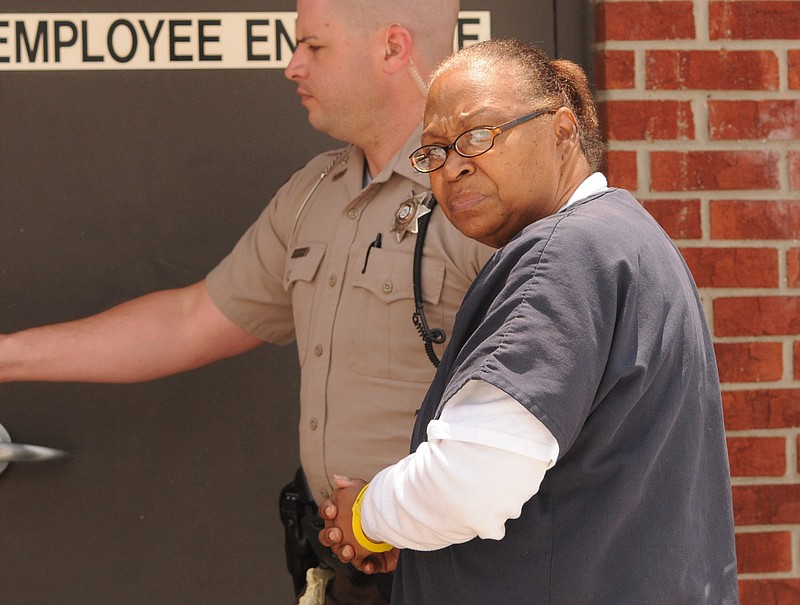RINGGOLD, Ga. - Clara Louise Edwards, the Ringgold woman accused of killing her foster child, faces up to 20 years behind bars.
A Catoosa County Superior Court jury convicted Edwards, 60, of cruelty to children in the first degree Thursday morning after deliberating for 11 hours over three days. The jury acquitted Edwards on a charge of malice murder and failed to reach a verdict on a count of felony murder. The group was split 10-2 on that last charge, though members did not say which way the majority of them leaned.
In Georgia, cruelty to children in the first degree carries a sentence of five to 20 years. Edwards, who was taken to the Catoosa County Jail after the trial, will return to court on March 25, when Judge Ralph Van Pelt Jr. will determine how long she should remain incarcerated.
The two murder charges against Edwards would have led to life sentences. However, the jury could not reach a unanimous conclusion about whether Edwards killed her 23-month-old foster child, Saharah Elise Weatherspoon.
On Wednesday afternoon, the jury told Van Pelt they were divided on the issue. Van Pelt told them to continue deliberating Wednesday afternoon. On Thursday morning, he read the jury an "Allen charge" - a reminder they must do everything they can to work through issues and reach a verdict.
Two hours later, around 11 a.m. Thursday, the jury sent a letter to Van Pelt, telling him they weren't making progress.
"We, your honor, are at a hopeless impasse," one of the jurors wrote to the judge.
With the jury out of the room, defense attorney Dan Ripper told Van Pelt, "I don't know what else can be done."
"I tend to agree with Mr. Ripper," said Herbert "Buzz" Franklin, the Lookout Mountain Judicial Circuit district attorney.
Van Pelt, who had urged the jury to reach a verdict through Tuesday afternoon and Wednesday, conceded that more time locked in a room together probably would not help the 12 men and women come to an agreement.
"It's not my intention to punish the jurors," he said.
The lawyers on both sides of the case could not comment on the jury's decision after the trial because Van Pelt issued a gag order, which is still technically in effect since the felony murder charge against Edwards is still pending.
Franklin and Assistant District Attorney Alan Norton can now launch a second trial against Edwards. This time, a new pool of jurors would consider only the felony murder count that this first group debated to a standstill. The prosecutors can't retry Edwards on the malice murder charge because this jury acquitted her.
On Dec. 29, 2013, Edwards said she found Saharah Elise Weatherspoon unconscious in her bedroom. She said Saharah had slipped down the stairs earlier that day but seemed fine at the time. When Edwards and her husband drove Saharah to T.C. Thompson Children's Hospital at Erlanger, doctors found no oxygen activity in her brain as well as two blood clots.
One of those blood clots was acute, meaning it had appeared on Saharah's brain within hours of her appearance at the hospital. The other was chronic, implying it was weeks or months old. Doctors also found bruises on Saharah's face, arm, stomach and back.
Franklin and Norton told the jury the chronic blood clot and the bruises prove that Saharah had been beaten frequently, and that Edwards' story about the girl falling down the stairs did not hold up. The prosecutors also relied on testimony from day care workers and congregants at Edwards' church, all of whom said Edwards seemed mean toward Saharah.
But Ripper pointed out that none of those witnesses ever saw Edwards abuse the child. And though people's complaints led to two Division of Family and Children's Services investigations in the months leading up to Saharah's death, the DFCS cleared Edwards both times.
Ripper argued that Saharah arrived at Edwards' foster home in 2013 with developmental delays, the result of her upbringing before DFCS took her away from her biological parents. Though almost 2 years old, Ripper said, Saharah struggled to walk. She fell a lot.
Contact staff writer Tyler Jett at tjett@timesfreepress.com or at 423-757-6476.

